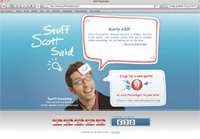 “Wow, that takes balls.”
“Wow, that takes balls.”
That’s what people tell you.
When you do something crazy.
When you go full time as an artist.
When you take the entrepreneurial plunge.
That it requires balls.
Cujones. Courage. Moxie. The willingness to step up and stick yourself out there.
I agree. I think it absolutely takes balls to change the world.
But.
Having balls (alone) isn’t enough.
As Lawrence Fishburne said in Boyz in the Hood, “Any fool can make a baby – but only a real man can be a father.”
TRUTH IS: Making a name for yourself begins with risk; but the only way to make it last is to blend it with regularity.
Here’s a list of ten strategies to help you hang in there, or, as I like to call it, pass The Testicle Test:
1. Focus is the mobilizing force. In The Tao of Abundance, Laurence G. Boldt reminds us that by learning to do one thing with total focus; you bring a clarity and simplicity to the whole of your life.
The question is: Will you stay focused in the face of incessant distractions trying to pull you away from your dream, or will the beckoning, elusive “door to more” seduce you into walking through?
Don’t let things derail you. Be very careful what you begin. Otherwise, spending your energies on the wrong causes will be the end of you. All that risk will lead to zero rewards, or worse yet, an abundance of rewards that don’t matter. How much money are you losing (not) focusing on your priorities?
2. Call upon untested faculties that await your discovery. Sustainability is a function of adaptability. That is, deploying your gifts in new ways to add new value. A helpful audit is to ask yourself the following questions once a quarter:
*Which of your skills do you rarely get the opportunity to use at work?
*What personal skills have you not tapped into yet to build your business?
*What personal skills have you not tapped into yet to add value to your customers?
Eventually, your arsenal of sustainability tools (backbone) will support your attitude of courageous action (balls). How many new skills have you recently become known for?
3. Mere movement is meaningless. Especially if you’re mistaking movement for progress. On the other hand, if you’re making real advancement – even if you’re moving at a glacial pace – eventually the world is going to notice.
As long as you don’t regret what you have set in motion. Instead, develop faith in the decisions you made. And know every step you take (as long as it’s a smart step) makes the probability of success higher. What are you moving toward?
4. Take personal and proactive responsibility for your own evolution. The first step is learning to recognize and refuse the old image of yourself. That way you’ll know what (not) to regress back into.
Next, be surgical in your improvement. Keep rotation constant. And be willing to trust the process of change. Otherwise, like the phone book, you’ll move closer to extinction with every passing day.
Third, don’t preserve yesterday. Reflect upon it, yes – dwell upon it, no. Learn from it, yes – be shackled by it, no. Remember: No adapt, no advance. You must be a willing participant in that process. What change are you afraid to invite?
5. Deliberately slow down. Success turns into failure when it comes too fast, too early or too abundantly. I experienced this about ten years ago. My career blasted off before I had the chance to get my oxygen mask on. Not surprisingly, my left lung eventually collapsed. Then I really needed oxygen.
That became the lesson about proceeding before you’re ready: Impatience pays off, but only when it’s balanced with intermission. I discovered that all the balls in the world are irrelevant when you’ve got a tube in your chest. Learn to honor what stops you. And if nothing stops you, stop yourself. Are you an expert at pressing the off button?
6. Recognize failure as part of the plan. Otherwise your remarkable inability to learn from past errors will be the seed of your demise. Instead, build the stamina to recover rapidly from disappointment.
Because the question isn’t, “Do you have balls?” but rather, “When the world kicks you in the crotch, how quickly do you get up?” It all depends on your adaptive capacity. Remember: The falling is inevitable – the harm is optional. What gifts have your failures given you?
7. Trust accelerates trajectory. Risk requires trust, and trust requires evidence. That’s the hard part. So, it becomes a process of uncertainty reduction through repeated action. The more venues in which you reveal yourself, the more trust you garner for yourself.
Your mission is to match each moment of risk taking (having balls) with three moments of backbone engaging (sustaining stamina). How did you increase your self-trust this week?
8. Sustaining is a function of restraining. My clients frequently tell me that the discipline that I administer is astounding. To work. To life. To everything. And I’m always grateful for that compliment because most people don’t notice it. They assume boldness solidifies success on its own.
This, of course, is a lie.
Discipline is the hallmark of greatness. The foundation of all creativity. The four-letter word that guarantees success. And it’s the differentiator that will set you apart from all other creative professionals. You just need to ask yourself what you’re willing to give up to get what you want.
Remember: Risky becomes stupid the moment it touches inconsistency. Do it everyday or don’t do it all. What waits you in the refining fire of discipline?
9. Poke savagely away. Genius is a great spark, but rededication is the firewood that keeps that fire blazing. Think Mozart or Beethoven were happy with being one-hit-wonders?
No way. They were hundred-hit-heroes. All because they risked initially, but (also) refused to discontinue the passionate pursuit of their craft indefinitely.
You owe your success to a pattern. Step back from the canvas, step back within yourself and steer clear of complacency. Otherwise you’re just another Right Said Fred: To sexy for your shirt, so sexy it hurts. How many hours did you practice yesterday?
10. Be always planting seeds for the future. Small deposits. Every day. With intensity of desire and consistency determination. And, if you don’t have any options – create some. Map it out. Plan your learning trajectory.
I do this every few years with my own business. I’ll map out where I’ve come, where I am, and where I’d like to be. Then I’ll brainstorm a list of seeds that need to be planted to make my envisioned future a tangible reality. What’s growing in your garden of success?
REMEMBER: Action without consistency always falls short of mastery.
Next time someone remarks to you, “Wow, that takes balls,” silently remind yourself of the following truth:
Yes, it takes balls to stick yourself out there – but it takes backbone to KEEP yourself out there.
LET ME ASK YA THIS…
Does your company pass The Testicle Test?
LET ME SUGGEST THIS…
For the ebook called, “15 Ways to Out LEARN Your Competitors,” send an email to me, and you win the list for free!
* * * *
Scott Ginsberg
That Guy with the Nametag
Author, Speaker, Entrepreneur, Mentor
[email protected]
 The world’s FIRST two-in-one, flip-flop book!
The world’s FIRST two-in-one, flip-flop book!
Buy Scott’s comprehensive marketing guidebook on Amazon.com and learn how to GET noticed, GET remembered and GET business!

 Being an entrepreneur is risky.
Being an entrepreneur is risky. The world’s FIRST two-in-one, flip-flop book!
The world’s FIRST two-in-one, flip-flop book! There’s nothing more threatening to the competition than someone who isn’t going anywhere.
There’s nothing more threatening to the competition than someone who isn’t going anywhere.
 1. Crazy is a compliment. If everybody says you’re nuts, you just might be onto something. Therefore: The only valid response to someone who uses that word to describe you is, “Thanks!”
1. Crazy is a compliment. If everybody says you’re nuts, you just might be onto something. Therefore: The only valid response to someone who uses that word to describe you is, “Thanks!”  The world’s FIRST two-in-one, flip-flop book!
The world’s FIRST two-in-one, flip-flop book! 1. Accepting. Don’t accept anyone else’s version of the truth. Don’t accept payment in politeness. Don’t accept the verdict that you’re not enough. Don’t accept that everyone you encounter has your best interests at heart. Don’t accept that life is out to get you. What have you mindlessly accepted?
1. Accepting. Don’t accept anyone else’s version of the truth. Don’t accept payment in politeness. Don’t accept the verdict that you’re not enough. Don’t accept that everyone you encounter has your best interests at heart. Don’t accept that life is out to get you. What have you mindlessly accepted? Who’s quoting YOU?
Who’s quoting YOU? “If everybody says you’re nuts – you just might be onto something.”
“If everybody says you’re nuts – you just might be onto something.” “Of course you’re crazy – that’s why we hired you!”
“Of course you’re crazy – that’s why we hired you!” The human need to feel needed by (and valuable to) the world is about as deep as they come.
The human need to feel needed by (and valuable to) the world is about as deep as they come. Your humanity is not a liability.
Your humanity is not a liability. People frequently ask me if I’m a motivational speaker.
People frequently ask me if I’m a motivational speaker.